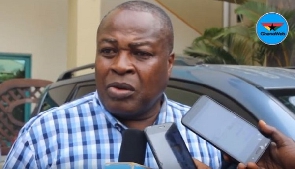... zero for Govt
AS a direct result of Ghana?s B+ credit rating, the private sector has been able to garner about US $421 million (?3.8 trillion) for international financial institutions for its operations within a period of nine months. Revealing this exclusively to The Statesman, Deputy Finance and Economic Planning Minister Kweku Agyemang Manu disclosed yesterday that between January and September this year the B+ credit made the local private sector credit-worthy enough to attract loans worth $421 million from the international financial support market.?The private sector got the amount because of our B+ credit rating and government guarantee through the comfort of the Bank of Ghana to assure the lenders that the risk of foreign exchange shortage will not occur,? Mr Manu told this paper.
The Minority Spokesperson on Finance and the Economy, Moses Asaga, however, insisted in an interview with The Statesman yesterday that it is untrue the B+ credit rating helped the private sector to attract loans totalling US$421 million.
?It is not true because the private sector is borrowing at a higher cost even with the existence of the B+ credit rating,? Mr Asaga stated. He pointed out that the operators in the private sector borrow at an excessive rate, citing Barclays Bank which recently borrowed at the London Inter-Bank Offer Rate of 7 percent. ?That B+ credit rating has not been used. It is not helpful to Ghana.? He contended that Ghana is not able to raise funding from the international market because it has agreed to a commercial borrowing ceiling of US$7 million. This International Monetary Fund conditionality incapacitated Government from utilising and gaining from its credit rating, he contends.
The National Democratic Congress Member of Parliament for Nabdam argued that if the B+ credit rating was beneficial to the country, then Government should have been able ?to float country bonds which people would subscribe to and the proceeds would be used by the government.?
According to the 2006 budget, payments will total ?39 trillion, while revenue will be ?26 trillion ? leaving a gap of ?13 trillion. Grants and loans will stand at ?7 trillion and ?5.7 trillion respectively. At the end of the consultative meeting recently, donors pledged to support Ghana with US$1.2 billion.
The World Bank Country Director, Mats Karlsson, stated earlier this year that the World Bank would rather encourage Government to concentrate on increasing internally generated revenue instead of borrowing from the global finance market.
Mr Karlsson said due to this focus on increasing domestic income, the World Bank decided to put in place a ceiling on borrowing externally. He was confident that if there was any shortfall, the World Bank and other development partners would provide the funding.
In a statement on the 2006 budget presented to Parliament Tuesday, Mr Asaga said: ?Ghana has a B+ sovereign credit rating which is being compared to Brazil? But the rating we have is ?all sound and fury.? Mr Speaker, a credit rating which cannot raise $1 is a junk rating.?
He noted that a good and gainful credit rating would have enabled Government to borrow between + 3 percent and + 4 percent at LIBOR. He said because Vietnam had a useful credit rating, it had managed to mobilise US$600 million worth of loans from the international financial market.
Deputy Finance Agyemang Manu defended the B+ credit rating, however, telling The Statesman it ?gives an indication of the country?s credit-worthiness? and gives confidence to lenders to offer credit to the private sector. He observed that the rating was a consequence of the way and manner Government had managed the economy.
?We compare cash inflow to know whether our cash outlay can meet our cash inflow. If we manage very well, our inflows will be good,? he said.



















